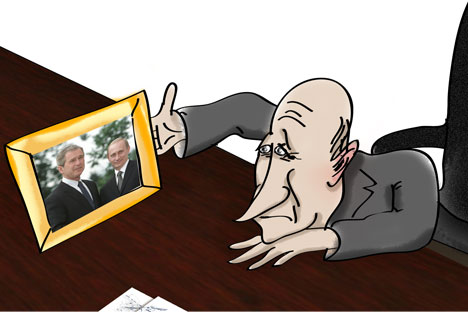
Drawing by Niyaz Karim. Click to enlarge the image.
There is a feeling that if the Snowden affaire had not come up, President Obama would have contrived something and still found a way not to come to Moscow for his private meeting with Putin scheduled for September.
He definitely had a good reason - the oppression of members of the LGBT community in Russia as an issue is currently being actively pursued in the West. The anti-gay law recently passed by the Duma, was the second public reason - something not really emphasized in our country - for Obama to refuse to come to the September summit.
Generally speaking, the real reason is that the two presidents do not really have anything to talk about – the agenda of our relations has come to a standstill.
There is no agreement on Syria and there will never be one (despite all the rhetoric, I believe that the truth lays on Russian ground). The Americans will never make concessions on European ballistic missile defense that Moscow would deem appropriate.
The major dramatic developments in this area will take place 10–15 years from now, when NATO, primarily thanks to the efforts of the United States, will reach a qualitatively new technological ability to repel missile attacks, significantly undermining Russia’s nuclear potential.
This is perhaps where Obama's initiative for a greater reduction (to one-third) of the nuclear arsenals of the two countries came from - one which was completely ignored by Moscow for some pretty clear reasons.
Russia is not going to make any other concessions on the issue of Iran, yet the U.S. will try to get on the right side of the new Iranian leadership. In Afghanistan, after a sharp reduction of the U.S. military presence in 2014, our services involving the transit of military cargos will no longer be needed.
The changes currently happening in the global energy market are making irrelevant talks of a possible U.S.-Russian strategic energy cooperation from the beginning of the century. As for trade, and the economy as a whole, our mutual trade turnover is ten times less than the U.S.-China turnover.
All these circumstances are superimposed by the fact that America does not treat Russia as an equal partner. Economic and ideological reasons seem to be behind this attitude.
Lavrov and the UN push for international conference on Syria
Moscow has U.S. Internet surveillance server - Vedomosti quoting Snowden's disclosures
However, the vast ideological differences with China did not prevent the United States from establishing relations as equals - even though much conflict exists. The reason for this is tens, and hundreds of billions of dollars of the economic interdependence.
Another problem is the poor personal relations between Putin and Obama. Obama's predecessor George W. Bush, in spite of his differences with the Russian president, was humanly closer to Putin. As long as Obama and Putin are at the helms of their governments, relations between the two countries will not improve significantly.
In all fairness, it should be noted that there is no “return to Cold War” in act. Most likely, a new long stage of “ignoring Russia” will become the main vector in American foreign policy as regards our country.
Georgy Bovt is a political analyst.
First published in Russian in Gazeta.ru.
All rights reserved by Rossiyskaya Gazeta.
Subscribe
to our newsletter!
Get the week's best stories straight to your inbox